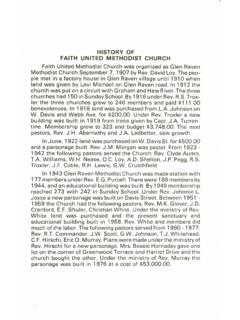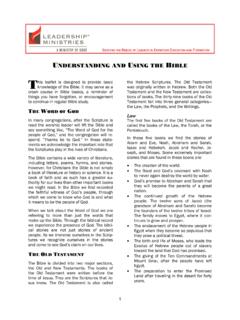Transcription of PLANNING FOR CHRISTIAN EDUCATION AND FORMATION
1 1 SERVING THE NEEDS OF LEADERS IN CHRISTIAN EDUCATION AND FORMATION PLANNING FOR CHRISTIAN EDUCATION AND FORMATION unday school happens. Vacation Bible school happens. The Christmas pageant happens. Lenten Fair happens. And on it goes. We can get so caught up in the day-to-day de-tails that suddenly time has passed without a deliberate effort to ensure that CHRISTIAN for-mation is happening. PLANNING is essential and must be done thoughtfully and wisely. GETTING READY TO PLAN Begin anytime. But you may want to think about PLANNING for a year. That may be the calendar year, from January through Decem-ber, or it may be a school year, such as from August to July.
2 At the least, plan about three or four months in advance. Decisions About Who Helps to Plan You may be tempted to initiate PLANNING by yourself, but this kind of PLANNING misses the wealth of knowledge that is available when others join the process. The work of the whole is more than the work of the individual parts. Do you know who the leaders of the CHRISTIAN EDUCATION and FORMATION ministries are in your congregation? Use the chart, What Is Your Situation (below) to help you recall some of the members of your congregation who have a strong commitment to the CHRISTIAN EDUCATION and FORMATION ministries of the church.
3 These people are potential partners and allies who can support and encourage opportunities and relationships that deepen their own faith and the faith of others. Perhaps they are leaders of CHRISTIAN EDUCATION and FORMATION ministries who need to join you in reading this book. There is a variety of groupings of people who can help shape the PLANNING for CHRISTIAN EDUCATION in your congregation. Consider these potential partners: Leaders of CHRISTIAN EDUCATION and forma-tion in your church. In small-membership con-gregations, leaders may include everyone in-volved in some aspect of CHRISTIAN EDUCATION and FORMATION ministry.
4 In larger congrega-tions, leaders may include representatives from Sunday school classes, age-level coun-cils, midweek groups, fellowship groups, and other small-group ministries. Staff and selected leaders from various congregational ministries who can represent the whole church s programming of ministries and will also help to prevent double booking on the church calendar. Small groups of people meeting to talk together about questions such as Where is faith being developed? How does CHRISTIAN EDUCATION in our congregation help people know God and learn biblical truths?
5 What helps people experience the love of Jesus? What other important issues do the members of our church need to discuss? These con-versations not only build relationships, they develop commitment, energy, and consensus. Settings to Consider CHRISTIAN EDUCATION and FORMATION happens in Sunday school, but not only there. In one way or another, CHRISTIAN EDUCATION and FORMATION is a component of everything that happens as a part of the congregation s ministry including worship, fellowship groups, commu-nity dinners, and committee meetings. There are, however, some ministries that are the direct responsibility of CHRISTIAN EDUCATION and FORMATION leaders, although the particular re-sponsibilities will depend on your congrega-tion s organizational structure.
6 In your plan-ning process, consider a variety of settings in which CHRISTIAN FORMATION could take place. S 2 Include different times of day and days of the week. Think about other locations away from your church facility or in an area of the church different from the one where Sun-day school usually meets. Consider the needs of the participants and the requirements of the curriculum. Then be creative with the possibilities for settings. Take a Sunday school class to the home of a homebound member. Do vacation Bible school at a nearby park or at a farm. Hold a brown-bag Bible study at an office building or a community center.
7 PLANNING for People Think carefully about the people you are plan-ning for and about their deepest needs. Think (or learn) about their developmental, physical, spiritual, and social needs. (See the chart, PLANNING for People. ) Traditionally we have planned for people by dividing into specific age groupings or grades in school or life-stage groupings. This plan works well, but it is not the only way. Consider across-age groups, teams of two or three families, groups of families of varied ages, or intergenerational classes. Think about the needs and gifts of people in your congregation or community who are differently-abled.
8 Plan for their inclusion to the fullest extent possible. As necessary, provide partners in learning to provide respite or sup-port for family members. Remember those who are unable to at-tend CHRISTIAN EDUCATION events. For home-bound members, use today s technology to include them in learning experiences or take the class to them. For those who travel frequently or who have regular family obligations, provide travel kits containing curriculum, a choice of learn-ing activities to do, or a regular means for keeping in touch. MAKING THE PLANS Make your plans, keeping in mind all you know about your unique setting and the Chris-tian EDUCATION and FORMATION needs of your congregation.
9 First spend time in prayer. Then begin brainstorming all the possibilities to consider, from the we-have-always-done-this to it-might-be-worth-a-try ideas. Put the list on newsprint or a dry-erase board so everyone can see it. When everything is listed Move all the must do items (Promotion Sunday, Christmas program, teacher training). to a PLANNING Worksheet (below). It will be helpful for each person to have his or her own copy of the worksheet. Ask everyone to put an X by anything left on the list that they personally would like to help lead or organize and an O by anything they would like to attend or see occur.
10 Tally the X s and O s, and move the items with the most marks to the PLANNING Worksheet. Continue with the Worth a try items until there is a general consensus that it is time to quit adding to the PLANNING Worksheet. Setting Priorities As the PLANNING Worksheet grows, you may begin to wonder, How can we do all this? Where will the time and energy come from to do all these great things? Clearly, you may have to choose and pare down to work within your capacities, so what criteria can you use to set priorities? How will you decide? It is our job as planners of CHRISTIAN EDUCATION and FORMATION to teach the fundamentals of the faith, to provide a safe place to learn and to experience CHRISTIAN community, to provide opportunities for skill building (praying, serv-ing, Bible study, worshiping, celebrating the sacraments, CHRISTIAN conferencing) and knowledge building (Bible, United Methodist history, rituals, and hymns and songs), and to have fun.








